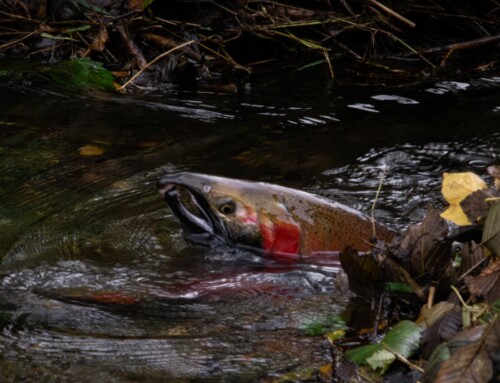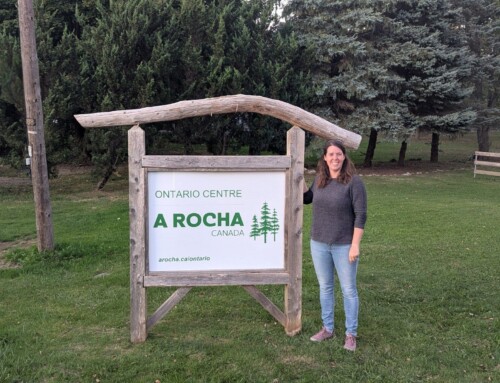A Reflection by Conservation Intern – Christel Dalhuisen
I am from The Netherlands, a land mostly existing of water. A land created by dyking and poldering. Seafarers are our ancestors. It is said that everyone born in the north, west and south are born with webbed hands and feet.
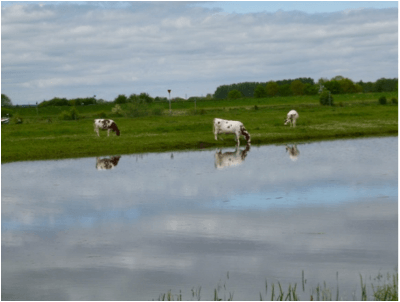 Before coming here as a Conservation Science intern, A Rocha Canada had let me know that my project would be on a fish species; you would think that it should be a piece of cake. Well, think again. First of all, I am from the east of the country. There is still a lot of water in the east, but we are not firstly known to be fishermen. We just stick with our cows and sheep, safe behind the dyke in our mill filled fields. Secondly, I am still working on my bachelor’s degree studying wildlife management – to be more precise, in terrestrial wildlife management. Of course, I know a fair bit about water systems. No ecosystem can thrive without water. But what did I know about fish? I do not like to eat them! The goldfish I had as a kid always died way too quickly. I have been to aquariums and know some names of species. Salmon I knew as those pink/orange fillets you can buy in the store. I never knew what a salmon actually looked like, let alone that there are so many different kinds of them.
Before coming here as a Conservation Science intern, A Rocha Canada had let me know that my project would be on a fish species; you would think that it should be a piece of cake. Well, think again. First of all, I am from the east of the country. There is still a lot of water in the east, but we are not firstly known to be fishermen. We just stick with our cows and sheep, safe behind the dyke in our mill filled fields. Secondly, I am still working on my bachelor’s degree studying wildlife management – to be more precise, in terrestrial wildlife management. Of course, I know a fair bit about water systems. No ecosystem can thrive without water. But what did I know about fish? I do not like to eat them! The goldfish I had as a kid always died way too quickly. I have been to aquariums and know some names of species. Salmon I knew as those pink/orange fillets you can buy in the store. I never knew what a salmon actually looked like, let alone that there are so many different kinds of them.
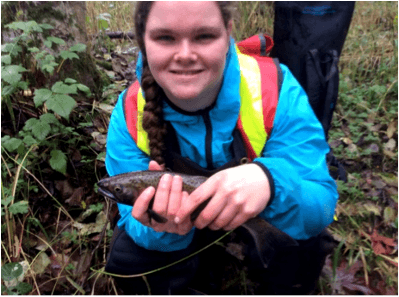 So, then, why go for a project in a country on the other side of the world to look at some fish? I did not necessarily want to come to Canada; I actually wanted to stay close to home. I also was not looking to work with fish. What I did look for was a way to combine my studies with my faith. A year and a half ago I made a 7-metre fall and I have been “lucky” to end with only a partially torn anterior cruciate ligament. A lot had happened in that short moment and I had never been so sure in my life that I had to start changing my course. In preparation for my last internship for my degree, I started to look at opportunities that combined wildlife and Christianity. My tutor, who was supposed to guide me, came with this main question over and over again: “It is a Christian organization, are you sure you want that on your resume?” It took some effort to find the right people to help me with this. But for some reason it all felt so right that I did not want to give up. In the end we agreed on A Rocha Canada and luckily they had a spot for me this fall.
So, then, why go for a project in a country on the other side of the world to look at some fish? I did not necessarily want to come to Canada; I actually wanted to stay close to home. I also was not looking to work with fish. What I did look for was a way to combine my studies with my faith. A year and a half ago I made a 7-metre fall and I have been “lucky” to end with only a partially torn anterior cruciate ligament. A lot had happened in that short moment and I had never been so sure in my life that I had to start changing my course. In preparation for my last internship for my degree, I started to look at opportunities that combined wildlife and Christianity. My tutor, who was supposed to guide me, came with this main question over and over again: “It is a Christian organization, are you sure you want that on your resume?” It took some effort to find the right people to help me with this. But for some reason it all felt so right that I did not want to give up. In the end we agreed on A Rocha Canada and luckily they had a spot for me this fall.
My main project was on the Salish Sucker. The name of this fish species is untranslatable to Dutch. Its story fascinates me. Extirpated in the Little Campbell River since 1976, it was found again by A Rocha interns in 2011 and 24 more have been caught since then. Its numbers are low, but it still finds a way to survive in this man-driven world. I did not catch any Salish Suckers this fall. But I did catch many different species and got to learn about them. Catching a Salish Sucker would have been a nice experience as well as a good sign for the species. But I believe that not catching them did not change my experience here. This is because my stay here was not about the fish. I worked as hard as I could on this project, but learned that my internship was not about this project. I was not here firstly to learn about fish or any of the fieldwork stuff. I was here for me! I have experienced things and learned things that I could never have expected. I thought it was going to be just another period of fieldwork. But now I have a much better view on what it is to be a Christian and that it is so much more than praying, reading the Bible and going to church. It is about how you live your whole life. I now see the relationship between being a Christian and what it actually has to do with conservation. My motivation, for conservation, finally makes real sense.
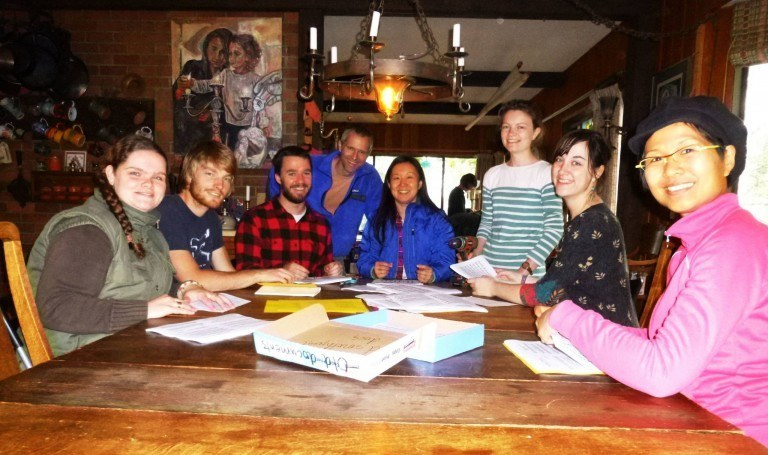
When going back, I can tell my tutor that I am proud that I can put A Rocha on my resume! When it comes to fieldwork, it makes no difference that A Rocha is a Christian organization, and I am happy to share this with my university. The difference is in motivation. A motivation, of which I am now more aware, I unknowingly already shared. My university will only see those things I have learned about fieldwork, not knowing that what I have learned beyond that is of much greater value.
Photos & Video by Christel Dalhuisen



